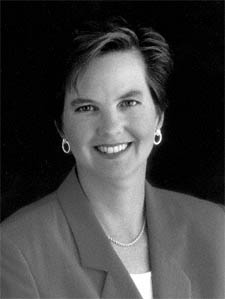
RICH,
POWERFUL
WOMEN
 by Mary K. Mewborn by Mary K. Mewborn Ever wonder where all the rich and powerful women are? Look no further. More than a dozen of the area’smost successful business-women can be found at the Tower Club attending their monthly RPW meeting. Neverheard of RPW? Don’t feel bad. Even one of its founding members has expressed surprise and delight overthe strength of their numbers and mused aloud, “the amazing thing about RPW is that, before RPW, I neverknew how many fascinating, powerful women there are out there.” They say it’s lonely at the top, andperhaps especially so for women who have traditionally been shut out of the “old boys’ network.” However,one highly successful woman has sought to change all that with the creation of “an informal group”comprised exclusively of female CEOs and presidents. Called RPW, the group’s creation was the brainchildof Kathy Clark, CEO & President of Landmark Systems, a $55 million software company. Currentlycomprised of seventeen of the Washington “area’s most accomplished businesswomen, “RPW” stands for (youguessed it) “rich, powerful, women.” So just how rich and powerful are these women? While most of itsmembers are exceedingly well-to-do, Clark explains that when it comes to being a rich, powerful, woman:“The criteria for joining is that within five years, you have to have a legitimate shot at being allthree. Of course I say that somewhat tongue-in-cheek,” she good-naturedly points out. Meanwhile, Clark herself is a genuine, self-made woman. Having grown up in a middle-class Marylandsuburb, she was barely out of high school before she had parlayed her first promotion “to a clericalposition” into a springboard for her own phenomenally-successful company. Her key to success: “a littlepiece of software” she and her former partner had developed “to help us do our jobs” at Blue Cross andBlue Shield in Washington, D.C. Now, seventeen years into growing her own successful business enterprise,she and fellow members of RPW are helping each other expand their horizons and meet the needs of thecommunities in which they live and work. Given that she has done so well on her own, how did Clark come to found a group based on the premise thatwomen must band together to get ahead and/or make a real difference? “Traditionally women have not doneas good a job [as men] at networking with each other and helping each other to become real leaders in thecommunity and the region, and that’s really kind of why we started,” she says, implying that for women,having money does not so readily translate into the ability to wield power. Nor, as it turns out, isaccess to “the old boys’ network” the answer. Ironically, Clark would break through that barrier only todiscover that in doing so she had developed a greater dependence on other women. As Clark explains, “Theidea...for [RPW] came about because I was invited to join a similar group called the 123 Club...a diversegroup of business leaders from around Northern Virginia who focus mainly...on trying to positivelyinfluence politics and business leadership. However, at the time I was asked to join, [the 123 Club] wasall men and all white.” Because of her status as the only woman, she was very high-profile and thereforewidely sought-after for speaking engagements and the like. To spread the wealth (so to speak), and alsoout of the need to reduce the enormous demands on her time, Clark reached out to female friends andcolleagues whose presence and expertise might be substituted for her own. The rest, as they say, ishistory. From its inception, RPW has had the symbiotic effect of women helping themselves by assisting one anotherto abet the larger community. Two years later, Clark and four other original founding members have seentheir ranks swell to seventeen, with one of their newest members coming onboard less than nine monthsago. Clark is quick to introduce the four other founding members: Carol Walcoff, of Walcoff, Inc.,“but she’s now increasingly into an Internet venture called Countrycool.com”; Julie Holgren,President & CEO of the Olympus Group, Inc., which provides a Web browser data-distribution service; Lovey Hammel, founder and CEO of Employment Enterprises, a staffing and services firm; and AnneCrossman, President of Completed Systems, Inc., “a groundbreaking software- development company.” Aswas the case at its inception, the group’s membership continues to represent a mixture of businesses,though the heaviest concentration is in “the tech world.” Those in the tech industry also include: Dolly Oberoi, Chief Executive Officer of C2 Multimedia, Inc.; Ann Stephens, President of PCData; Lou Scanlan, President & CEO of UUcom, Inc.; and M. Titi McNeill, President & CEO ofTranTech. Members are mostly married, several have children, and one has a baby on the way. They range in age fromlate-20s to mid-fifties. Most gained admission to the group “pretty much based on being recommended by amember.” And, of course, all members must have the undeniable potential to be rich and powerful, althoughbeing a member of RPW certainly improves one’s chances of becoming a wealthy mover and shaker. Indeed, members can rely on one another for everything from professional advice to emotional support. “Wesupport one another in our business, community, and charitable endeavors,” states founding member AnneCrossman, and as a group they are “fairly well involved in a lot of community activities.” For example,“Anne Crossman was nominated by another member to participate in the Leukemia Society’s Woman of the Year[event],” Clark says, and “we decided that was a great project... and that we would support that.” Theresult was that Anne “raised the most money; she won.” Meanwhile, Crossman, who had previously lost aclose relative to leukemia, is quick to credit the group for supporting her both “spiritually andfinancially.” Further she adds, “We’ve [often] been able to give each other press, and support each otherin reward by nominating one another.” Of course, RPW members remain true to their origins by referringone another to groups who need female speakers in a given field of expertise. Moreover, “it is notunusual for members to do business amongst each other,” Crossman points out. Leslie Davis also speaks of RPW as a “support group.” One of the group’s newest members, shearticulates a clear sense of the nurturing nature of the women under whose wing she has been taken. Whileshe doesn’t actually refer to her fellow members as mentors and advisors, Davis is grateful for the“help” they have given her “in growing a business,” and “avoid[ing] pitfalls with a new business...” Mostimportantly, she says, the group keeps her from feeling she’s the only one who has ever encountered aparticular problem, allowing that “it’s a comfort to know you’re not alone…to be able to talk to peoplewho have been there, done that.” While the group meets at the Tower Club once a month, between meetings members keep in touch via e-mail.Although many are close friends who would routinely want to see each other anyway, the regularlyscheduled meetings ensure that they can count on where and when, although as Clark points out, “themeetings are varied. Sometimes it’s just us and we have fun and just talk about issues,” while othertimes, “we invite guests, whether political people, or other business people, or groups.” They have hadfolks “from the 123 Club come and talk about what it means to be a leader in the region” and they haveeven had “some joint meetings between the RPW group and the 123 Club.” They also held one joint meetingwith both the 123 Club and representatives of the Indian High-Tech CEO Council, which Clarkenthusiastically termed “a really fascinating meeting,” perhaps because of the Indian High-tech CEOCouncil’s growth in stature to become nearly as powerful as the Greater Washington Board of Trade or theNorthern Virginia Technology Council. Like the 123 Club, RPW is increasingly involved in politics both individually and as a group,” Clarksays. “We are getting more active in upcoming political races and keeping track of issues.” However,Clark says the group has no spe-cific political affiliation, a fact reinforced by their willingness todine with both Chuck Robb and John Warner in recent months. Nor do the women as a grouphave any agenda they are trying to push. Rather, as Clark puts it, their interest is “largely predicatedon the fact that, part of being powerful is learning and understanding how the whole political processworks,” which is not to say that these rich, powerful women are in any way apolitical or nonpartisaneither. “We have die-hards from both parties,” Clark contends. Indeed, it is widely rumored that onemember may even have her sights set on the possibility of running for office. As a group, however, Clarkwill say little more than that. “Clearly there are issues we think are important, transportation beingone of them, and certainly some issues related to the technology industry, but,” she reiterates, “rightnow, we don’t have a specific agenda.” If Clark is not precise as to what policies RPW backs, she seems quite clear about the fact that they arenot a feminist organization. Indeed, in empha-sizing this, Clark has gone so far as to say “we are not awomen’s group,” meaning that their issues are not women’s issues per se, nor are they beholden toany philosophy or mindset concerning so-called women’s rights. According to Clark, even the quest for“equal pay for equal work,” for example, does not figure into their efforts. However, more than onemember runs a company aimed specifically at women. For example, there is Susan Williams, whosemuch-heralded enterprise, womenCONNECT.com, was recently picked by Washingtonian magazine as “one of thetop twenty businesses to watch.” Notable too is the fact that it is backed in part by venture capitalfrom the Women’s Growth Capital Fund, more evidence on how the notion of women helping women is takingoff. Melissa Moss, President & CEO of Women’s Consumer Network, is also an RPW member. Hernational organization, which is specifically “run by women for women,” helps women save time and money byproviding member discounts on everything from stockings to automobiles. Still, the most Clark will allow is a summary of the group’s goal for the greater good: “All of us haveexperienced some degree of success in busi-ness, and we feel now we need to learn what the next step is.How do we take that [success] and leverage [it] to do good things for the people who are going to followin our footsteps, or for the people who are moving into our area?” It is, she admits, a mission and alearning experience that’s “a lot of fun.” While the group is said to be a comfortable size at seventeen members, it would seem likely that it willbe self-propagating or at the very least copied by others, such that perhaps one day we will see chaptersof rich and powerful women throughout our area (if not throughout the country and the world.) While it isdoubtful that anyone would ever want to be termed part of “an old girls’ net-work,” the idea of womenhelping women cer-tainly seems workable and commendable, and of course still far preferable to simplybeing one of the boys.

|

